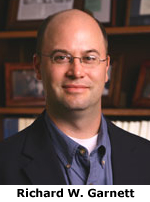
When President Bushs controversialfaith based initiativesare discussed next week before the Supreme Court, their constitutionality wont be at issue, according to Richard Garnett, associate professor in theNotre DameLawSchool.
On Feb. 28, the court will hear arguments in the case of Hein v. Freedom from Religion Foundation.The case involves theFaith Based and Community Initiatives Plan,which the foundation argues is a violation of the First Amendments prohibition ofestablishmentsof religion.
The crucial thing to understand about this case,Garnett said,is that the court is not going to decide whether or not the White House plan violates the Constitution.Instead, the only issue before the court is whether the Freedom from Religion Foundation is the right party to challenge that plan in federal court.
Garnett, an expert in church-state relations, said thatgenerally speaking, federal courts are not open forums for complaining about allegedly unconstitutional government action.Only parties with a stakewith standingcan bring a constitutional case in federal court.
Usually the fact that a person does not like the way her tax dollars are being spent is not enough. However, in church-state cases, the rule is different.In a 1968 case called Flast v. Cohen, the court created an exception to its standing rules for taxpayers claiming that some congressional expenditures violate the Establishment Clause.The question for the justices in Hein is whether this exception applies when a party wants to challenge an executive program, like the president’s faith-based initiative, rather than a congressional spending enactment.
This issue might seem technical,Garnett admitted,but it is both important andinteresting.On the one hand, why should the courts standing rules be looser, simply because a would-be litigant is invoking the Establishment Clause?On the other, why should the Flast exception be unavailable, just because the challenged spending decision is made by the president, and not Congress?
The Flast v. Cohen exception is hard to defend, but it has been around for nearly 40 years.On the other hand, the new chief justice is known to believe that ‘standing’ is an important constitutional requirement.
TopicID: 21363